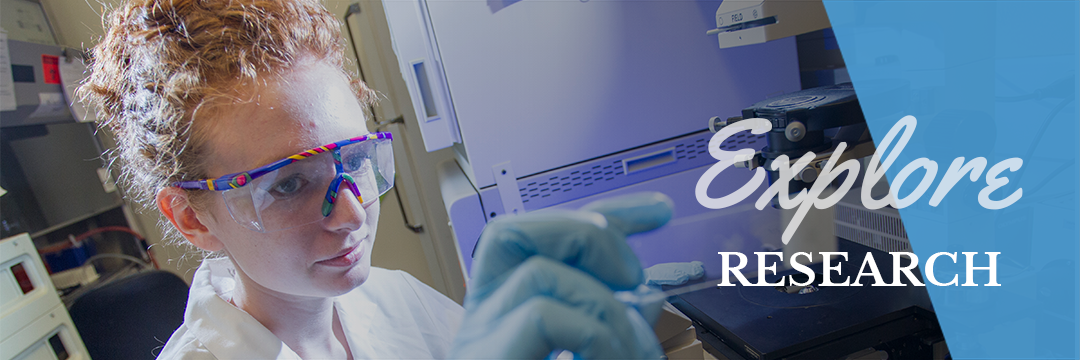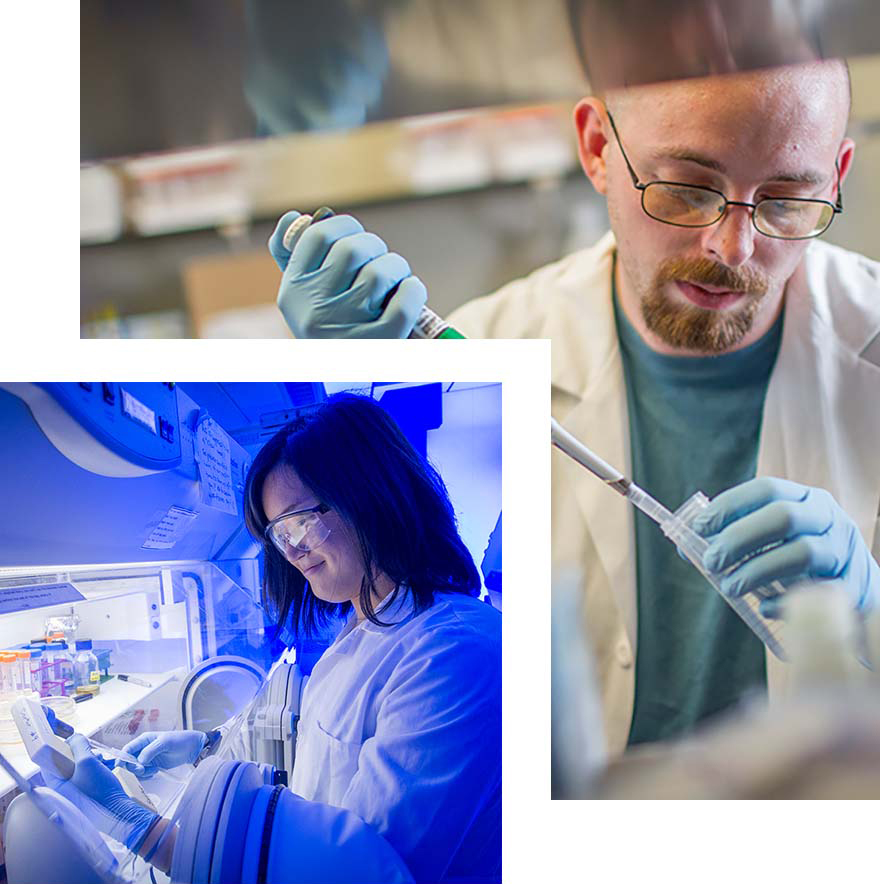Research

We are committed to advancing the understanding of gastrointestinal and liver diseases, and developing new treatments and cures for those who suffer from these conditions. We publish more than 250 scientific manuscripts published each year. Twenty-five faculty have received grant support from the federal government, foundations, and industry. Total UNC GI research funding exceeds $20 million annually, placing us among the leaders in research funding in the U.S.

Focus Areas
Our nationally and internationally recognized researchers have interests that span the full spectrum of gastrointestinal and liver diseases. The following are particular areas of emphasis:
Members of the UNC GI Division have made major contributions to our understanding of the cause of colorectal cancer and approaches to screening and early detection. Current research is investigating the immune contexture of colorectal polyps, the relationship between the gut microbiome and colon polyps and cancer, stool DNA and other biomarkers for the detection of colorectal cancer, and the comparative effectiveness of different colorectal cancer screening tests. UNC GI investigators also study colonoscopy quality, best practices for colonoscopic polyp resection, and the use of artificial intelligence to improve the performance of colonoscopy. Researchers in the GI division collaborate with other investigators in UNC’s Gillings School of Global Public Health, UNC School of Pharmacy, and UNC’s Lineberger Comprehensive Cancer Center on a variety of population health projects related to colorectal cancer screening and health disparities research.
Affiliated investigators: Seth D. Crockett, Temitope Keku, Sarah McGill, David F. Ransohoff, and John A. Baron.
UNC is one of the few divisions in the country to have a center dedicated to research and clinical advances in the care of patients with esophageal diseases. At the UNC Center for Esophageal Diseases and Swallowing (CEDAS), our research focuses on pre-cancerous and cancerous conditions of the esophagus, including Barrett’s esophagus (BE), as well as gastroesophageal reflux disease (GERD), eosinophilic esophagitis (EoE) and the other eosinophilic gastrointestinal diseases (EGIDs), and esophageal motility disorders. A major focus of our work is to develop new testing strategies and treatment options for these diseases. With our affiliated basic science labs, we perform translational research to better understand the pathogenesis of BE, esophageal cancer, EoE, EGIDs, and GERD. We also have a large clinical trials program designed to advance treatment of these conditions.
Affiliated investigators: Luke Chen, Evan S. Dellon, Swathi Eluri, Craig Reed, and Nicholas J. Shaheen.
The UNC Center for Functional Gastrointestinal and Motility Disorders has been a top center internationally for research on irritable bowel syndrome, constipation, and fecal incontinence. Research includes translational studies on the stool microbiome and genetic contributions to IBS; clinical studies of the physiological and psychological mechanisms for symptoms; development and validation of diagnostic criteria; epidemiological studies; and systems-based research on health care delivery. Randomized controlled trials of biofeedback and other behavioral interventions are a unique strength of the UNC Center. The current funding is a multisite study of the effectiveness, cost, and safety of two treatments for fecal incontinence, which are biofeedback and intra-anal injections of dextranomer as a bulking agent. Co-investigators are the Mayo Clinic, Augusta University, University of Michigan, University of Alabama at Birmingham, University of Minnesota, and Research Triangle International.
Affiliated investigators: Spencer D. Dorn, Olafur S. Palsson, Yolanda Scarlett, William E. Whitehead.
Research in the intestinal stem cell group is focused on mechanisms underlying ISC maintenance and differentiation in physiology and disease. We study the interrelations between the epithelial stem cells (ISCs) and cells of the ISC niche, including Paneth cells, enteroendocrine cells and lymphocytes. Outside of basic biology questions, the group has a strong interest in developing new ISC-driven ex vivo platforms to model and report epithelial functions, such as barrier function, nutrient handling and host-microbiota interactions. CRISPR-gene editing on 2D gut ISC monolayers is also a major focus of the group to develop more precise and robust genetic disease models. All together we have a comprehensive team of ISC investigators that emphasize translating basic science and biomedical engineering to address challenging problems in human GI health conditions.
Affiliated investigators: Scott T. Magness
Affiliated Investigators: Shifali Arora, Edward L. Barnes, A. Sidney Barritt, Seth D. Crockett, Evan S. Dellon, Spencer D. Dorn, Swathi Eluri, Millie D. Long, Andrew Moon, Anne Peery, David F. Ransohoff, Craig Reed, Nicholas J. Shaheen, Robert S. Sandler.
The members of the UNC Multidisciplinary IBD Center for Research and Treatment are nationally and internationally recognized IBD researchers in the fields of epidemiology, genetics, mucosal immunology and the intestinal microbiome. The physicians of the IBD Center direct national and international multi-center clinical trials on novel IBD treatments and collect observational clinical data and biosamples for IBD patients in various large prospective cohorts. Funding for such diverse research come from organizations including the NIH, the Crohn’s and Colitis Foundation, the Patient Centered Outcomes Research Institute, the Helmsley Foundation, and industry.
Affiliated Investigators: Jonathan J. Hansen, Hans H. Herfarth, Kim L. Isaacs, Michael D. Kappelman, Millie D. Long, R. Balfour Sartor, Shehzad Z. Sheikh, Kim Weaver, Edward Barnes.
The UNC Liver Center Faculty conduct a wide-range of epidemiologic, clinical outcomes research, and clinical trials. There are multiple industry, NIH, and PCORI sponsored programs investigating the treatment nonalcoholic fatty liver disease, drug induced liver injury, hepatocellular carcinoma, psychosocial factors in chronic liver diseases, COVID-19 in liver disease, and liver transplant outcomes.
Affiliated Investigators: A. Sidney Barritt IV, Jama Darling, Donna Evon, Michael W. Fried, Andrew Moon.
The intestinal microbiome – defined as the cumulative genomes of the enteric microbiota – has been implicated in the genesis and perturbation of numerous gastrointestinal (GI) diseases, including inflammatory bowel diseases, irritable bowel syndrome, and colorectal cancer. Basic scientists in our division that investigate the relationship between the intestinal microbiome and GI diseases use state of the art technology to characterize the taxonomic composition, functionality, genetic content, and transcriptome of the complex microbial community in the GI tract.
Affiliated Investigators: Aadra Bhatt, Andrea Azcarate-Peril, Ian Carroll, Ajay S. Gulati, Jonathan J. Hansen, Temitope Keku, Robert S. Sandler, R. Balfour Sartor.
Center for Gastrointestinal Biology and Disease
Since 1983 the research for the division has been coordinated by the Center for Gastrointestinal Biology and Disease, one of the 17 Digestive Disease Research Centers funded by the National Institutes of Health. The mission of the center is to promote and enhance multidisciplinary digestive disease research. The center sponsors:
- Core laboratories that provide training, technical support, laboratory animals, assays, and other services.
- A scientific enrichment program – seminars, lectures by visiting scientists, professional workshops – that advances the intellectual environment for GI research.
- A professional development and training program that promotes the growth of junior faculty.
Learn more about the center and its members at the Center for Gastrointestinal Biology and Disease website.
Leave a Reply
You must be logged in to post a comment.